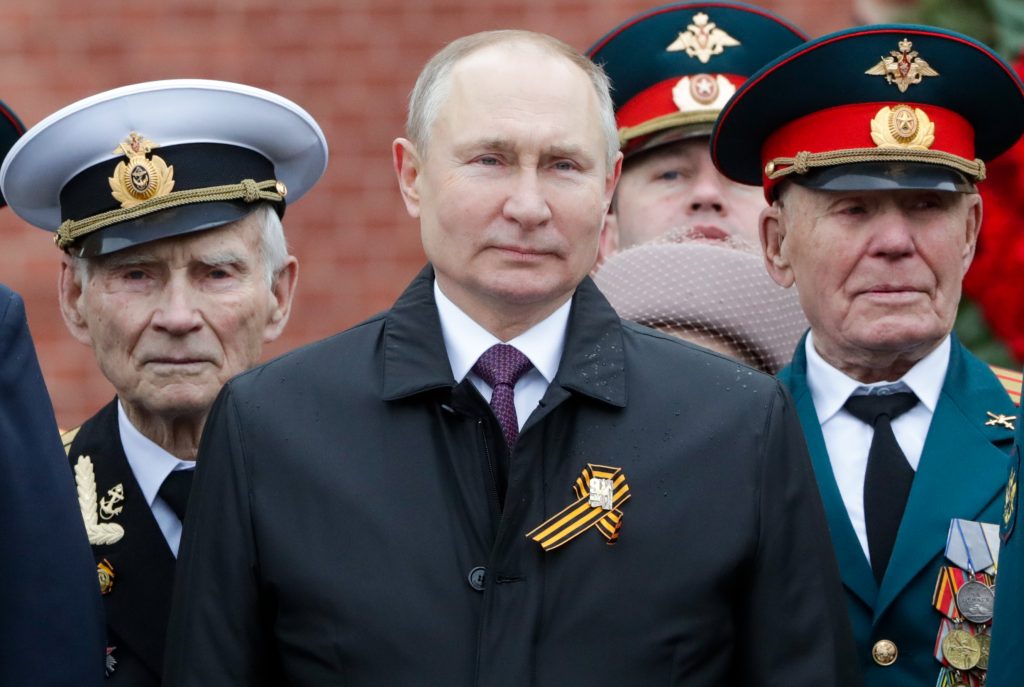By Bohdan Vitvitsky, for UkraineAlert
Ever since 2014, Russian President Vladimir Putin has weaponized history as part of his hybrid war against Ukraine. On numerous occasions, most infamously in his July 2021 essay “On the Historical Unity of Russians and Ukrainians,” Putin has used highly selective interpretations of the past to undermine Ukrainian national identity and legitimize his own expansionist imperial ambitions.
Putin’s distortions have been widely ridiculed and rejected inside Ukraine itself. However, aspects of the Russian ruler’s narrative remain largely uncontested in the international arena, with damaging consequences for outside understanding of the current conflict. If the international community wishes to truly appreciate the issues at stake in the confrontation between Russia and Ukraine, it must first cut through the layers of historical disinformation constructed by the Kremlin.
Putin’s central message is the idea that Ukraine has always been part of Russia and must remain so. He routinely refers to Russians and Ukrainians as “one people” and frequently blames outside influences for manufacturing what he regards as an artificial divide between the two modern nations.
In reality, while today’s Russia and Ukraine do indeed share long periods of common history, they have spent considerably more time apart than together. Ukraine’s experience of Russian rule is also much darker than Putin cares to admit and makes a mockery of his attempts to sanitize the imperial past. Far from being fraternal nations, many Ukrainians see their historical relationship with Russia as being more akin to that of an abused spouse in a forced marriage.
No honest reading of Russian-Ukrainian relations would characterize bilateral ties as a partnership of equals. Instead, the relationship was defined for centuries by Russian efforts to exert ever greater control over Ukraine while suppressing Ukrainian nation-building efforts.
Early incidents of note include the 1709 Sack of Baturyn, which saw Russian troops slaughter the entire population of the Ukrainian Cossack capital city in an atrocity that echoed across Europe. As Russian imperial control over Ukraine strengthened during the eighteenth and nineteenth centuries, so did efforts to prevent the evolution of Ukrainian national identity.
This process included extensive restrictions on the use of the Ukrainian language. No single document captures the Russian denial of Ukrainian identity quite as succinctly as the 1863 “Valuev Circular.” This czarist decree banning Ukrainian-language publications states matter-of-factly, “a separate Ukrainian (“Little Russian”) language has never existed, does not exist, and shall not exist.”
Russia’s anti-Ukrainian agenda expanded dramatically in the twentieth century with catastrophic consequences.
Potential national leaders were frequently targeted. During World War I, the advance of Russian imperial troops into what is today’s western Ukraine led to the arrest and imprisonment of Andrey Sheptytsky, the Metropolitan Archbishop of the Ukrainian Greek Catholic Church and a prominent personality within the Ukrainian community.
In the chaotic period following the 1917 Russian Revolution, Bolshevik armies repeatedly invaded Ukraine and ultimately crushed the country’s first major statehood bid. Ukraine’s attempts to establish an independent state were equally opposed by the anti-Bolshevik White Russian Army. Indeed, opposition to Ukrainian independence was one of the few things upon which the two sides could actually agree.
The next chapter in the Kremlin war on Ukrainian statehood was to prove by far the bloodiest. During the late 1920s and early 1930s, Soviet dictator Josef Stalin unleashed a wave of coordinated terror against the Ukrainian intelligentsia and the Ukrainian peasantry in a bid to eradicate the threat to Soviet power posed by Ukraine’s statehood aspirations.
Countless Ukrainian writers, scientists, clergy and school teachers were arrested and executed or sent to the Gulag on trumped up charges of “bourgeois nationalism.” Meanwhile, a deliberately engineered artificial famine devastated the Ukrainian countryside, leaving an estimated four million dead. This Stalinist campaign would later be held up as a classic example of genocide by Raphael Lemkin, the man who coined the term and initiated the Genocide Convention.
Policies of russification remained the norm in Soviet Ukraine right up until the final years of the USSR. They are now being revived in regions of Ukraine currently under Russian occupation as the Kremlin seeks to reassert its authority by eradicating traces of Ukrainian identity.
Since 2014, Ukrainian language education has been removed from the curriculum in Russian-occupied Crimea and eastern Ukraine. Other symbols of Ukrainian identity such as the Orthodox Church of Ukraine have also been relentlessly targeted by the occupation authorities. Russia’s actions expose the grim reality behind Putin’s protestations of brotherly love.
This long record of atrocity and oppression rarely features in international media coverage of the current conflict between Russia and Ukraine. Instead, correspondents are more likely to make casual references to a shared past without seeking to clarify the troubling character of this historical relationship.
Encouraged by the apparently endless credulity of the international community, the Kremlin has taken its distortions to new extremes. In recent months, Russia has surrounded Ukraine from the north, east, and south with a formidable invasion force, while at the same time insisting it is Ukraine that poses a security threat to Russia. The sheer audacity of Moscow’s claims would be enough to make Orwell chuckle.
Russia’s recent demands for “security guarantees” are self-evidently absurd and should be treated as such by the international community. Likewise, Vladimir Putin’s attempts to portray Ukraine’s long and traumatic experience of Russian domination as a benign brotherhood should no longer be allowed to pass unchallenged. For too long, history has been one the Kremlin’s favorite weapons. The time has come to disarm it.
By Bohdan Vitvitsky, for UkraineAlert
Bohdan Vitvitsky is a former Federal Prosecutor with the US Department of Justice. He served as Resident Legal Advisor at the US Embassy in Ukraine from 2007 to 2009 and later served as Special Advisor to the Prosecutor General of Ukraine.





